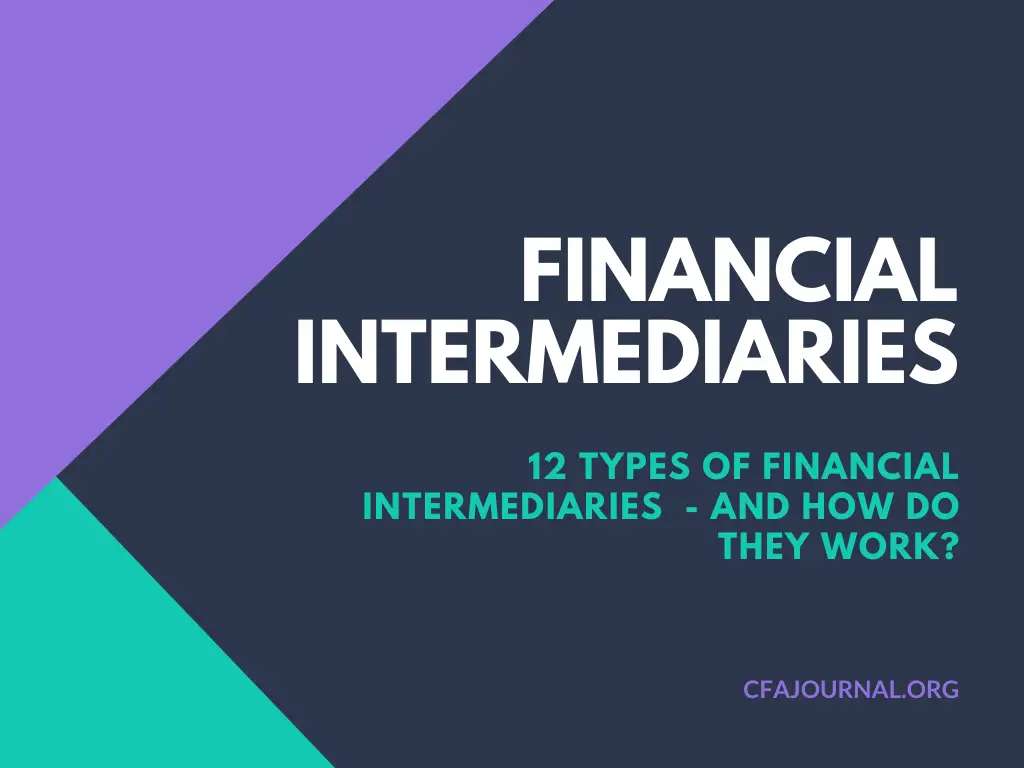A financial intermediary means an institution that acts as a middleman between two parties in order to help financial transactions. Financial intermediaries are highly specialized and they connect market participants with each other. Financial intermediaries include banks, investment banks, credit unions, insurance companies, pension funds, brokers and exchanges, clearinghouses, dealers, mutual funds, etc.

1) Banks
Banks are the most popular financial intermediaries in the world as they are highly regulated by the government and play an important role in economic stability.
Bank’s different kinds of specialties include savings, investing, lending, and many other sub-categories. Banks accept deposits from the public and creates credit products for borrowers.
2) Investment Banks
Investment banks are specialized in large and complex financial transactions. Investment banks provide advice to their corporate clients in issuing new capital, in issuing a wide range of securities, and in mergers and acquisitions. They also assist their clients in obtaining debt financing and with potential takeover targets.
3) Credit Unions
The credit union is a member-owned type of bank that is governed by a board of directors who are elected by the members. The credit union helps members by offering credit at a competitive rate.
The difference between typical banks and credit unions is that credit unions are for serving their members necessarily with no profit motive. Besides lending money, credit unions may also look after credit-related activities.
4) Pension Funds
Another popular financial intermediary is a pension fund which is for full-time employees. The pension fund is used by employees to save for their retirement by investing. After retirement, employees get all the contributions, interest, and realized gains.
5) Insurance Companies
There are different types of financial intermediaries that help individuals and companies offset the risks for a premium. Insurance companies offer risk mitigation at a low cost. Insurance companies are highly regulated but sometimes they suffer from fraud and moral hazard.
6) Mutual Funds
A mutual fund is an institution that pools money from many investors and invests the money in different securities. A mutual fund is a popular choice among investors because they offer features like professional management, diversification, affordability, and liquidity.
7) Stock Exchanges
Another financial intermediary is a stock exchange that acts as a market where stock buyers connect with stock sellers. The stock exchange acts as a large platform that facilitates every transaction of people. Like other financial intermediaries, they earn revenues by adding transaction fees and interest rates.
8) Clearing Houses
Clearinghouse acts as a middleman that arranges the final settlement of trade in future markets. Clearinghouse provides security and efficiency for financial market stability.
It acts as an intermediary between a buyer and seller to ensure the process of trade is smooth. Clearinghouse imposes margin requirements to mitigate risk. Basically, clearinghouses provide extra security by assuring that the transaction will occur smoothly so that investors can trade freely.
9) Financial Advisors
A financial advisor is a financial intermediary who is responsible for executing trades on behalf of their clients. Financial advisors use their expertise to achieve the financial goals of clients. Investment advice is an important reason to work with financial advisors, but they also assist in every aspect of financial life. They also assist their clients in other areas like budget, savings, insurance, and tax strategies.
10) Dealers
A dealer acts as a principal who buys and sells securities for their own account. In the security market, a dealer buys security for its own account and makes a profit by selling the security. Dealers assist in creating liquidity in the market. Dealers should be registered with the Securities and Exchange Commission (SEC) and must comply with the requirements.
11) Securitization
Securitization transfers liquid assets or a group of assets into security. Securitization distributes risk by aggregating assets in a pool and then issuing securities backed by the assets. Financial intermediaries securitize many assets such as bank loans, car loans, mortgages, and credit card receivables.
Financial intermediaries divide the securities into different categories which have different rights to cash flows from the asset pool.
12) Arbitrageurs
They make a profit from market imperfections by taking advantage of the price difference between two or more markets. Usually, they attempt to make a profit from market inefficiencies. It is the act of buying a product in one market and selling it in another market at a high price.
The transactions should occur at the same time to avoid market risk because the prices may change before the transactions are complete. Arbitrageurs are experienced investors and they play an important role in the operation of capital markets because their efforts in utilizing price inefficiencies keep prices more accurate.
